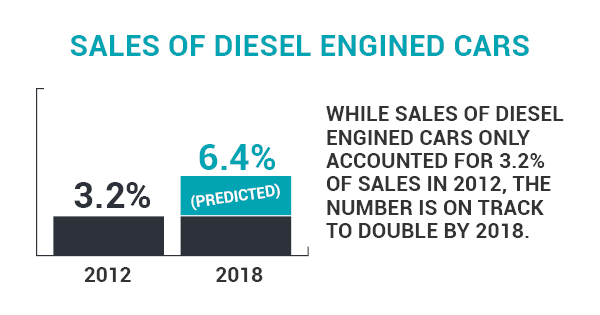Diesel engines offer a lot of benefits, including greater power and performance than many gasoline engines. That appeal has led to an uptick in diesel owners. About twice as many people drive diesel vehicles as 10 years ago, and many diesel owners are driving their first diesel engines.
That means there are now more diesel vehicles on the road. They have become an affordable option, offer excellent performance, and of course, there is also the appeal of that classic diesel engine sound.
Those benefits of driving a diesel also come with a learning curve. There are aspects of diesel maintenance that first-time owners will need to get accustomed to as they enter the world of diesel. Learning these essential diesel care tips will help them keep their car and diesel engine working efficiently.
Diesel vs. Gasoline for New Diesel Owners
One of the biggest differences between a diesel engine and its gasoline counterpart is the injection system. Diesel injectors operate differently. Unlike conventional engines, the diesel engine receives its fuel delivered as a fine mist from several fuel injectors.
Diesel injection is a fine-tuned system. Each injector delivers the precise amount of atomized fuel for the exact amount of power needed from the engine. The vehicle’s computer system determines the consistency of the fuel and the amount.
Because its delivery method is so different, diesel fuel has additives that allow it to combust from pressure alone, whereas gasoline needs a spark.
But the performance fuel additives take a toll on a diesel engine, slowly building up deposits in the engine and fuel injectors. As deposits build up in the fuel system, elements of the system become clogged, including the injectors. When fuel injectors get clogged, they fail to deliver the right amount of fuel in the right consistency, which affects the engine with:
- Decreased fuel efficiency
- Added driving expense over its gasoline-powered counterparts due to decreased efficiency
- Reduced power, making the car slower
- Increased and dirtier emissions
Clogged fuel injectors can also cause engine problems. Symptoms of dirty fuel injectors include:
- Difficulty starting
- Rough idling
- Inconsistent RPMs
- Failure to start
To rectify the situation, mechanics will use ultrasonic waves to help clear out the deposits. But this diesel injector treatment is expensive, as is attempting to clean the fuel injectors on your own. Some diesel owners opt to clean each injector by taking it apart and carefully cleaning each component, but this requires some care because the components are easily damaged and need to be put back together correctly.
How to Clean Fuel Injectors on a Diesel
Knowing how to clean diesel injectors can help you save money and take better care of your vehicle. The best way to clean fuel injectors is to use a commercial injector cleaner.
Added to the fuel, these chemicals will remove the build-up while your car is running without any negative effects on the way your vehicle runs.
The fuel cleaner can also help alleviate problems outside of the diesel fuel injection system that affect your entire diesel fuel system. From the hoes to the pies, even the fuel pump will benefit from an injector cleaner being regularly used.
The process of how to clean diesel fuel injectors is relatively straightforward.
- First, buy a fuel additive specifically designed for diesel engines.
- When you are ready to clean your injectors, warm up the engine for a few minutes.
- Then turn off the engine and remove the fuel filter and drain it completely.
- Fill the fuel filter with the diesel fuel additive. Also, fill the fuel filter housing with the additive.
- Reinstall the fuel filter, making sure there is no air in the filter or the housing.
- Once everything is back in place, start the engine and run it for a few minutes.
- Then turn off the engine and let it sit for several minutes to let the additive soak the fuel system and break down deposits.
- Finally, start your vehicle and drive it for at least half an hour to circulate the fuel additive thoroughly through your fuel system.
Once your diesel injection system is clean, you can keep it that way by adding a diesel fuel additive directly through the fuel tank. You can do this every 2,000 to 5,000 miles depending on the conditions in which you regularly drive.
Choose the Right Parts for Your Diesel
Whether you are a new diesel engine owner or have been driving them your whole life, it can be difficult to know what is best for your car’s health. The best things you can do for your diesel are cleaning and maintaining the system regularly and ordering fuel injectors from Dieselogic.
To guarantee that you are practicing the best diesel maintenance for your diesel engine and fuel injectors, be sure to speak with a Dieselogic professional. As industry leaders in diesel vehicles, we are here to ensure your satisfaction.


Leave A Comment